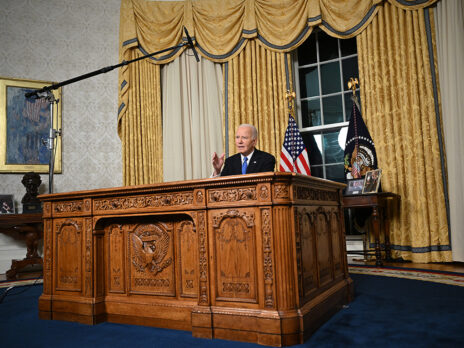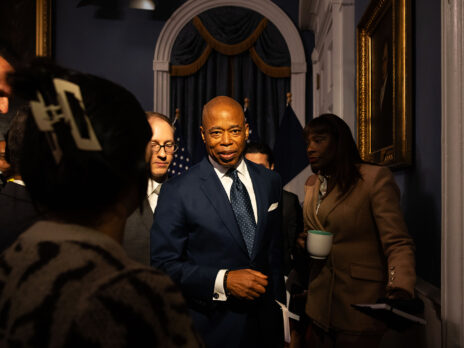
It is the picture that has come to symbolise the Angela Merkel era. At a G7 summit in June 2018, the German chancellor stood in a huddle of prime ministers and presidents, confidently explaining an issue to a seething Donald Trump. Even as infighting erupted within her party, eventually forcing her to declare that she would not stand in the September 2021 Bundestag elections, this image of the chancellor lecturing an erratic US president cemented her position as the iconic European leader of the early 21st century.
That Merkel would achieve such a dominant position seemed unlikely when she first took power after a brutal election campaign in 2005. Having secured a wafer thin lead for her centre-right Christian Democrats (CDU) and its Bavarian sister party the CSU over Gerhard Schröder’s centre-left Social Democratic Party (SPD), Merkel had limited room for manoeuvre. Her rise as Chancellor of a Grand Coalition between CDU/CSU and SPD seemed more the result of the weakness of opponents within her party or Schröder’s macho blundering in the hours after the election than any wave of enthusiasm for Germany’s first female chancellor.
Merkel strengthened her position by consolidating reforms begun by her predecessors in the SPD-Green governments of the late 1990s and early 2000s. Stabilising institutions and calming debate played well with German voters who felt exhausted by the years of relentless change that had followed the fall of the Berlin Wall in 1989. In a period when German voters were preoccupied with expansion of state nursery provision or taxation reforms promoted by ambitious ministers such as Ursula von der Leyen or Peer Steinbrück, EU politics and foreign policy played a peripheral role in public perceptions of Merkel’s leadership.
The succession of crises that sealed Merkel’s transformation into one of the key players in global politics escalated in the final year of the Grand Coalition and gained momentum during a coalition government with the free-market liberal FDP that lasted between 2009 and 2013. Starting with the global financial crisis, German voters saw their chancellor at the forefront of frantic efforts to protect the EU from an onslaught of calamities. Whether it was Russia’s seizure of Crimea and war in the Donbas region of Ukraine, the struggle to stabilise the Euro, the collapse of EU border controls through a surge of refugee migration or the scramble to contain COVID-19, Merkel’s crisis management strategies have been defined by two recurring themes.
The first builds on a leadership style that projects authority in a studiedly unheroic fashion. Generating an image of calm gave Germans the impression that her leadership would insulate them from turmoil in the wider world. When her position as chancellor was shaken by the collapse of the EU border system and the arrival of hundreds of thousands of refugees in the summer of 2015, her ability to remain steady under pressure reassured enough voters to secure her political survival despite the rise of the nationalist Alternative for Germany (AfD). In one of the many paradoxes of the Merkel era, after 2015 this emphasis on stability above all else generated a degree of support even in EU states that suffered from her doctrinal rigidity during efforts to save the Euro – precisely because the calm she projected played to a hankering for quiet in the aftermath of chaos.
[See also: How Olaf Scholz and the SPD could lead Germany’s next government]
The second recurring theme in Merkel’s approach to crisis management was a willingness to shift power to EU institutions in order to protect a European integration process that underpinned Germany’s prosperity and stability. While projecting an image of calm and continuity in the face of emergency conditions, Merkel has fostered Europeanisation to an extent that would have been considered radical when she started her political career in 1990. With European Central Bank president Mario Draghi’s quantitative easing programme to save the Euro, the centralisation of border management into Frontex’s hands and EU bonds for its COVID recovery fund, Merkel has played a key role in accelerating the EU’s shift towards a more state-like trajectory in ways that went far beyond what had once been entrenched German red lines over the limits of European integration. Though frustrating for critics who demand that the EU goes further, as well as opponents for whom she had gone too far, Merkel has accelerated a radical transformation of the EU system to preserve stability.
Yet in her quest to keep things as they are through willingness to change, Merkel has left German society unprepared for the challenges of managing a system whose underlying dynamics have shifted substantially from those she inherited in 2005. In presenting the need for further European integration in defensive terms, Merkel has not confronted German voters with the difficult choices all member states face over how to use the growing power of the EU to protect collective European interests. Her success in sustaining a sense that Germany could be insulated from global chaos has fostered an atmosphere of drift in which vacuous statements of concern are considered an adequate substitute for the ability to take concrete action.
After Merkel leaves the stage, the EU system she has done so much to transform is likely to be shaped more through the hyperactive interventionism of France’s Emmanuel Macron or the ruthless pragmatism of his Italian counterparts than fractious governing coalitions in Germany that will emerge after September’s elections. Whoever is the next EU leader to stand at the heart of an era-defining image of European politics, it is unlikely to be a German chancellor.
[See also: The SDP surge reveals the essence of the German election: the search for Merkel 2.0]





